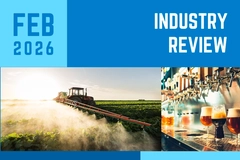
- Industry news
Industry news
- Category news
Category news
- Reports
- Key trends
- Multimedia
- Journal
- Events
- Suppliers
- Home
- Industry news
Industry news
- Category news
Category news
- Reports
- Key trends
- Multimedia
- Events
- Suppliers
War and extreme weather exacerbate food crisis, research warns

10 Jan 2023 --- Barclays has revealed a research report examining how the war in Ukraine, coupled with extreme weather events, is threatening food security globally, potentially turning back years of progress.
The report, entitled, “Global food systems under mounting pressure,” raises concerns about rising food protectionism.
“With extreme weather events coinciding with trade restrictions and conflict, years of positive progress in reducing hunger and poverty are being rapidly reversed,” says Hiral Patel, global head of sustainable and thematic research.
“The war in Ukraine shows how a localized shock can cascade through international supply chains.”
According to Barclays, increased trade protectionism related to food will only exacerbate the situation as more than 40% of the world’s calorie intake currently comes from just three crops, wheat, maize and rice, produced in a handful of countries.

Disruptive changes
Barclays’ Impact Series uses data-driven analysis to explore the social impact of economic, demographic and disruptive changes affecting markets, sectors and society.
Despite having eased off the highs reached early last year, food prices are likely to stay high, leading to shortages in the most vulnerable countries reliant on imported food.
Notably, FoodIngredientsFirst has covered food inflation in depth over the past few months and inflation is one of the key industry topics.
 Barclays’ Impact Series is raising concerns about rising food protectionism.Data from the UK reveals annual growth of Britain’s food prices hit 13.3% in December, the highest since 2005 when records began.
Barclays’ Impact Series is raising concerns about rising food protectionism.Data from the UK reveals annual growth of Britain’s food prices hit 13.3% in December, the highest since 2005 when records began.
Similarly, Francois Sonneville, director of beverages at RaboResearch, told FoodIngredientsFirst that consumers and companies should prepare for years of price fluctuations and unforeseen market disruptions as the world moves into an era of increased volatility.
The Barclays research also underscores that rising food insecurity will likely lead to social unrest and increased migration from the poorest parts of the world.
Concerns have mounted that the global food crisis has not yet reached its peak, with predictions that inflation will continue to creep up this year and the crisis will become about affordability, not availability. The food-assistance branch of the United Nations, the World Food Programme (WFP), warns that 2023 might be even worse than the crippling events of 2022, underscored by food prices remaining stubbornly high.
Reduced crop yields pose threat
Meanwhile, record temperatures and prolonged droughts will lead to reduced crop yields in many regions, adding to pressures on food production and distribution caused by the war.
Last week, we reported how a partnership between the EU and the Food and Agriculture Organization of the United Nations is set to provide US$15.5 million to ensure and support Ukrainian food systems impacted by the ongoing war. The funding will support the continued functioning and reinforcement of value chains in agriculture, fisheries and forestry during conflict conditions.
Unseasonal heavy rains in India ahead of the harvest season have reduced and deteriorated summer-sown crops such as rice, soya bean, cotton, pulses and vegetables, while also impacting the plantation of wheat.
In October, FoodIngredientsFirst reported that the shrinking value of the currencies of most developing economies is driving up food and fuel prices in ways that could deepen the food crises that many already face, according to the World Bank’s latest Commodity Markets Outlook report. While it forecasts that next year may see some respite for soaring grain prices, it remains wary of the volatility Russian interruptions of Ukrainian trade may yet bring.
Agricultural prices are expected to decline by 5% next year. Wheat prices in the third quarter of this year fell nearly 20% but remain 24% higher than a year ago.
Edited by Elizabeth Green













